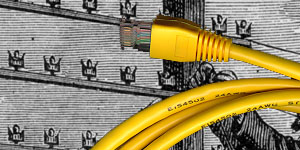


The Empire Strikes Back
Consumers are the consumed in a consumer society. Corporations and governments, through advertisers and the mass media, buy chunks of consumer attention the way we buy bars of soap. Mass communication providers, essentially, sell us to ourselves.But for most net denizens---at least today---the net is something quite different. People use it to reach out to others and ask or answer the same questions we all implicitly ask: What's it like there? How do you live? What makes you laugh? Why do you cry?
Censorship is a wedge corporations and governments often use to split the blocks of social solidarity resulting from such exchanges. All through the recent past, whenever a new and unregulated communications channel has appeared---a broadsheet, the telegraph, television, or a computer network---business and government have seen it only as a tool of corporate revenue or social control.
Some of the new channel's users don't want that control. They want the freedom to say anything they please, to anyone they please---which, inevitably, displeases others. The unexpurgated consequences of normal human life---sexual, religious, racial, and political---frequently offend them and they complain. The power brokers use those complaints to quash the freedom of the new medium. Eventually, it becomes as controlled as all the old media. That's the way it's always been. Despite the present tidal wave of freedom, it will probably happen with computer networks too.
Television was once seen as a similar brave new frontier of widespread education and justice and equality for all. Soon, though, it turned into a friendly monster that sidled up to us every evening and, by dangling pretty images to distract us from the earnestness of life, slowly, methodically, began to eat our minds.
Still, there's some hope for those who believe in freedom of expression. Unlike all past media, a computer and a telephone line are the only things you need to participate in the discussion. You don't need a printing press or a television station. Eventually what you need should become as small, as cheap, and as common as a telephone. Although most governments still regulate the telephone lines, no one, at least publicly, monitors the content sent along them. And with a telephone you can only speak to one, but with a computer you can speak to millions.
Further, the net, as it exists today, is extremely decentralized. If two people want to communicate and someone blocks a line between them, there's always another path to connect them. Today's net handles censorship the same way it treats a broken connection---by routing around it. Of course, if some corporation or government manages to seize control of the net, that could change. As yet, however, it isn't tied to big commercial interests. It's still relatively cheap---at least for the educated middle classes of advanced nations. So its content remains largely unregulated. It isn't controlled from above, because there's no ``above'' to do the controlling.
On the net today, you can say anything you wish to anyone you wish. Theoretically, in a free society, that shouldn't make any difference; you supposedly always have that right. But it's one thing to get up on a soapbox in the park and speak your mind to a few dozen people and quite another to express your opinion to a few million people.
Before the net, only a few people, backed by governments or big corporations, could do that---and they had to spout the party line. In an age of mass broadcast media alone, a few large vested interests could control what was said. They told us what to think---or at least, what to think about. That's not so easy when there are millions of cheap, decentralized communication channels. On the net, theoretically at least, millions can hear you---no matter who you are and no matter how little social or economic power you hold. And that, perhaps, is the foundation of freedom: the freedom to speak your mind.